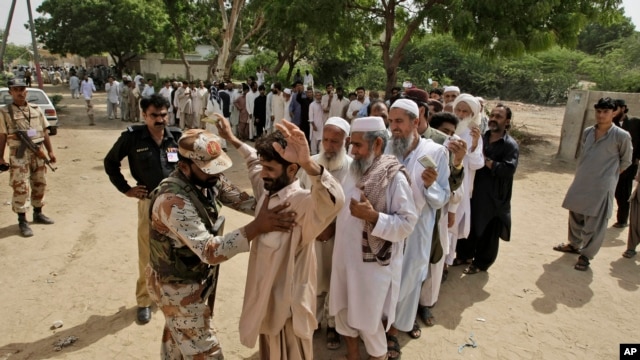Pakistani Elections: High Security, Strong Turnout
|
|
Date: 5/11/2013 8:00:26 AM
Sender: VOA
|

A Pakistani paramilitary soldier checks voters before they enter a polling station to cast their ballots, in Karachi, Pakistan, May 11, 2013.
ISLAMABAD — Polls have closed in most areas in Pakistan, in historic elections that will bring about a transition from one civilian administration that finished a full term in office to another civilian administration.
Voters went to the polls Saturday to choose a new national assembly and four provincial assemblies. Army and police were on standby to prevent any major attacks after weeks of election-related violence killed more than a hundred people. Scattered incidents of violence killed at least 14 people on Saturday, but overall observers report voting went smoothly.
Voters predicted record turnouts in Pakistan’s national elections, as hundreds of people from wealthy to poorer neighborhoods alike lined up outside their local polling stations determined to cast their votes.
The elections mark the first time in the country's history that a civilian government has finished its term and handed over power to another civilian government via the ballot box.
For decades, Pakistan has been ruled either by the military or its two main parties, the outgoing Pakistan People’s Party, and the Pakistan Muslim League-Nawaz led by veteran politician Nawaz Sharif.
But this time, Pakistani politician and former cricketer Imran Khan entered the fray with his Pakistan Tehreek-e-Insaf or PTI party, vowing to change the system.
His message has resonated with many here, such as university student and first-time voter Noor Ul Aein.
“This is the first time that I believe that we have hope, and we need a miracle, and I hope whatever happens, happens for the best, because we really do need a miracle," said Noor Ul Aein. "Since I have been born I have been hearing bad things, suppression, depressions in the economy, everything so I think we really need a miracle right now and we have hope, and we have hope this time, we really do. Vote for change and vote for “naya” (new) Pakistan.”
Standing in line to cast his vote in a mud brick neighborhood with the occasional goat walking by, Muhammad Farhan said the country’s new leaders will have their work cut out for them.
“Obviously there are lots of challenges because we have not been performing good as a nation, as in economics, as in law and order," said Farhan. "The biggest challenge would be law and order, and then the economic conditions, which must be improved.”
Militants and extremists from the northwestern tribal areas down to the commercial city of Karachi repeatedly bomb and attack civilians and security forces in Pakistan.
In the run-up to the elections they turned their anger to party candidates and supporters, killing more than 100 and injuring scores more.
Pakistan’s police were out in force to protect voters Saturday, and the army was placed on standby in the country’s most violent areas.
But many people, such as university student Kanza Shakeel and her family in the bomb-targeted city of Quetta, ignored the threats of violence and came out to cast their ballots. She said her whole family would stay up all night to hear the results of this landmark election.
“My family all, my relatives also here today, we are sitting in front of TV, and eating lunch, dinner, everything in front of TV, and just hearing news, nothing else, we are just hearing news, and we are just waiting to get good news,” said Shakeel.
Pre-election polling indicated former prime minister Nawaz Sharif and his party were the front runners, with Imran Khan’s PTI a close second. |
|
| |
